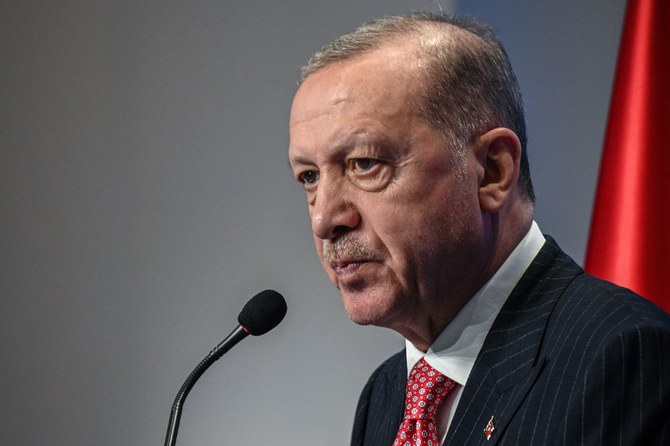LONDON: The Turkish president’s last-minute withdrawal from the COP26 Summit in Glasgow this week is yet more evidence of his disastrous environmental strategy and his inability to listen to his own people, experts have told Arab News.
Recep Tayyip Erdogan withdrew from the summit, aimed at building a multilateral consensus to address the climate crisis, at short notice on Monday, the inaugural day.
He cited “security concerns,” claiming that London was not allowing him and his entourage to bring sufficient vehicles to the summit.
But experts have told Arab News that the dubious justification for his last-minute withdrawal is more indicative of his attitude toward tackling climate change — and of listening to his own people — than it was of concern for his own safety.
“Erdogan will go down in Turkish history as the leader who caused the greatest ecological damage in the country with his insatiable appetite for construction and mining projects,” Aykan Erdemir, senior director of the Turkey Program at the Washington-based Foundation for Defense of Democracies and a former member of the Turkish Parliament, told Arab News.
In recent years, Erdogan’s government has made headlines for pushing forward with audacious plans to build a huge shipping lane through Istanbul, effectively turning large parts of the 16-million-person city into an island that intersects Europe and Asia.
That project — expected to cost over $15 billion — has been slammed by critics for its worrying environmental impact, which includes destroying some of Istanbul’s last few forested areas and threatening to further degrade the city’s already poor air quality with toxic fumes from massive container ships.
Public skepticism of the project has gone largely ignored, and Ankara has gone to great lengths to prevent the formation of credible opposition groups that might challenge Erdogan’s environmental record.
“For over a year, the Erdogan government has refused to register Turkey’s Green Party, in clear breach of the country’s political parties law, in yet another sign of his aversion to environmentalism,” Erdemir said.
“The Turkish police’s brutal treatment of environmentalists throughout the country reflects Ankara’s troubling approach to climate activism.”
A spokesperson for COP told Arab News: “As hosts of COP26, we are pleased that around 120 world leaders are able to attend, given this is a critical moment for the future of our planet. We look forward to welcoming the Turkish delegation to COP26, and welcome President Erdogan’s recent commitment to achieve net zero emissions by 2053.”
But Erdemir said Turkey’s commitment to reaching net zero via the Paris Climate Accords only came “after three European countries and two international finance organizations offered financial inducements.”
In the last year, wildfires have decimated the Turkish coast, killing nine people, and a deluge of toxic “sea snot” has washed up on the country’s shores, preventing fishermen and others who rely on the sea from carrying out their jobs and pursuing their livelihoods.
“With all of the environmental disasters the world over, but especially in Turkey … ostensibly, Erdogan should be prioritizing (attending COP),” Minh-Thu Pham, a senior advisor at strategic advisory company Connect Frontier and a former UN observer, told Arab News.
“I think, clearly, he’s not made the best decisions regarding climate. It didn’t look great that he decided to withdraw,” she said, adding that political leaders will find a “convenient reason” to back out of something when they “really don’t want to do it.”
Pham continued: “People in Turkey are hurting, and we know that the underlying cause of some of the environmental problems there is climate change, so for him to have shown up would’ve sent a really important signal. A lot of people will see that and wonder about his motivations.
“Leaders who don’t feel like they have to listen to their citizens don’t feel the pressure to have to do something about the climate, even when their own citizens are suffering greatly.”
Pham added: “When the club of countries come together to try to do something on climate, it becomes glaringly obvious that those who aren’t are failing their people. Hopefully, their citizens will notice that and try to do something about it.”






















